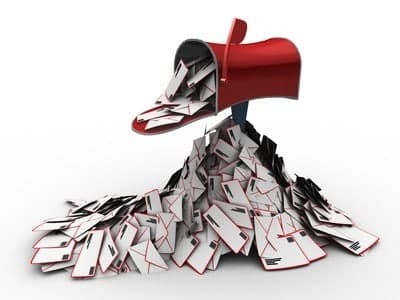 Email is a time-waster. Fact. If you are “average” then you spend one hour every day simply sorting through your emails. And if you are also “average” you spend an hour a day in “attention shift” where your brain switches off for moments as you move from one task to email and back to your task again. This means that the typical office worker is losing two hours a day to email.
Email is a time-waster. Fact. If you are “average” then you spend one hour every day simply sorting through your emails. And if you are also “average” you spend an hour a day in “attention shift” where your brain switches off for moments as you move from one task to email and back to your task again. This means that the typical office worker is losing two hours a day to email.
If you didn’t have email you’d get more work done.
Except, of course, that email is the preferred way of sending information to each other. Besides, it is faster and more reliable than ordinary “snail mail”. Plus it is the fuel for much global business – international companies simply could not cope without email. Whatever business you are in, email is essential.
But does it have to rule your life?
We need to accept that the vast majority of email we receive is unnecessary. Apart from the typical 150 spam messages that most inboxes get each day, there are also the never-ending list of promotional messages asking you to buy something you don’t really need or want. Then there are the “CYA” (Cover Your A%*se”) emails where you are cc’d “in case” you need to know – you don’t…! On top of this, there are messages alerting you to things you have already seen on your social networks – how kind of them to let you know twice. Er…not…! Typically, most people receive only about six email messages each day which are real messages that require action. The rest can be ignored.
Yet, we wade through the detritus because we think that is work.
Productive, efficient workers tend to check their email inbox just once every day – usually first thing in the morning. They look at their emails and do one of three things:
- Immediately delete the dross
- Answer anything that will require less than two minutes of time
- Make an appointment in their diary to deal with those messages that will take longer than two minutes to answer
They also tend to have filters and “sub” inboxes, or separate folders, where specific messages get diverted. For instance, if you have messages from a specific customer that you want pre-sorted you can have an inbox just for that company, with filters diverting any emails from them into that special folder. You can then immediately see vital emails that require your attention.
Sadly, though, the vast majority of people only have one inbox and do not set up special automated filters. This wastes time, increases brain processing activity that drains attention from real work, making people feel as though they are working and being productive, when they are not.
Enter the new Gmail.
Coming soon to an inbox near you is the latest incarnation of Gmail which essentially forces you to have sorted inboxes that will make you more productive. The video below gives you an insight into what the new Gmail will look like. It looks like it could save you a great deal of time. Of course, you could do all this yourself with filters and folders – but the reason most people don’t do that is it is such a faff. With the new inbox from Gmail you are much more likely to be efficient because the ability to pre-sort your email is easier to achieve.

